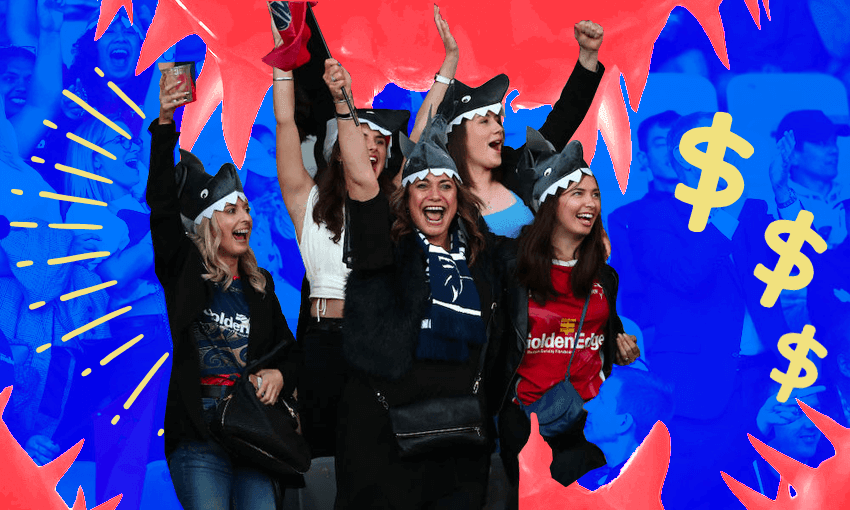New Zealand’s youngest provincial rugby team is fundraising by offering fans exclusive access to their inner sanctum. The future of Tasman rugby could depend on it.
Recently, an “outsider” voiced his plans to revolutionise rugby in Aotearoa. Too many rugby supporters hibernate after a season ends, according to Sky Television’s new head of commercial, Justin Nelson, who wants to transform their seasonal inertia into all-year-round “tribalism”.
Of course, rugby is an important investment to Sky TV, but Nelson’s mission could help steer the future direction of New Zealand’s national sport. Fans are a sport’s one constant, he says. “They can be there from the moment they’re born to the moment they die. Players aren’t. Coaches aren’t. Sometimes even teams and franchises aren’t.”
Sixteen years ago, Tasman Rugby Union (TRU) didn’t exist; it formed in December 2005 as an amalgamation of the Nelson Bays and Marlborough rugby unions. But New Zealand’s youngest provincial union has made a name for itself since – in 2019 and 2020, TRU won back-to-back National Provincial Championship (NPC) titles with the Tasman Mako, and has featured in six of the competition’s last eight finals.
The new union has already produced 11 All Blacks, 14 Māori All Blacks, nine New Zealand sevens players and three Black Fern sevens representatives. Symbolically, these players “throw up a fin” to celebrate tries, and fans make the winning gesture in solidarity. There’s even a hashtag: #FinzUp.
These days sporting codes are jostling for attention and loyalty, which have traditionally been earned through ticket sales and spectator numbers, TRU chief executive Lyndon Bray explains. But the union wanted an initiative that reached farther, lasted longer and bolstered an already strong sense of Tasman tribalism – and TRU has found it in an exclusive membership club, the Mako “Finatics”.
In return for apparel perks, personalised content from the team and unique behind-the-scenes experiences throughout the NPC season, Mako fans anywhere in the world can donate $55 per season over five seasons or a one-off payment of $250, with the money geared at developing the community game in Nelson, Marlborough and the wider region.
The union is aiming to sign up 10,000 fans within the next two to three years, achieved by drumming up support over successive NPC seasons and converting that interest into actual certificates. The CEO won’t divulge any numbers on actual certificates handed out, except to say the union has received “a whole lot of activated interest” since launching in late July.
While the scheme is believed to be a world-first in rugby, fan ownership isn’t without precedent. The TRU looked to the Green Bay Packers for inspiration: for nearly 100 years, the NFL team from Wisconsin has been the only publicly owned franchise in the American football league. In 2021, just over 176,000 new shareholders were added to its share registry, bringing the total number to more than half a million, and about $111 million was raised.
Unlike the Packers, however, Mako Finatics won’t technically own a stake in the team – members won’t receive dividends or be able to trade actual shares. It’s “ownership in italics”, Bray says, but it’s potentially a springboard for more concrete contributions down the line. One day, a Finatic could join TRU’s board or help elect the union’s president. They’re merely suggestions at this stage, but the CEO agrees that incorporating democracy into the scheme fits well with the grassroots origins of rugby.
Mako Finatic number one Murray Sturgeon is eager to continue supporting the provincial game. Sturgeon chairs Nelson Pine Industries, a wood processing company that has sponsored the union and its predecessors for nearly four decades. Businesses must be good corporate citizens, he says, listing Nelson Pine’s philanthropic endeavours, including sport – specifically rugby. “It keeps youth occupied and off the streets.”
In his personal capacity, however, Sturgeon the Finatic wants to support the development of Tasman’s next generation of players. “We have to look to the future,” he says, and Nelson Pine will be there – the company has renewed its sponsorship for another five years. “That takes us to 40 [years]. I think that’s a record in itself, isn’t it? But we do it for the good of the region and the good of the people.”
The players are embracing the initiative too, “throwing each other under the bus in front of the camera, getting a fair bit of extra banter going on,” laughs Mako assistant coach James Marshall. He knows first-hand the value of having loyal fans – as Mako number 57, the former Hurricane and All Blacks sevens player played 36 games for Tasman between 2008 and 2011, a period of mixed success for the nascent union. Right from the beginning though, the homegrown support was palpable, he says, and it’s only intensified in recent years as the Mako have realised their championship-winning potential.
Fans, he says, make rugby the sport it is. “You realised that when Covid hit – the fans were taken away from the game, and it’s just not the same without them,” says Marshall. “You can really feel the difference when you’ve got that local support behind you.”
Mako fandom has gone global, too: Tasman players who receive All Blacks call-ups are eager to show spectators their provincial side’s fin-like callsign, with the likes of Will Jordan and David Havili “constantly crossing the line at the highest level, still proud of where it all started for them.” The salute, first credited to Mako great Andrew Goodman back in 2009, has become compulsory, not that the players mind. “The boys all love it,” Marshall says.
Long-standing support and passionate players are all well and good, but the game has no future if youth aren’t willing to play it. Some teenage player attrition is natural, Bray explains – there’s no university in the region so school leavers who play rugby and want to pursue tertiary education leave Tasman to study and play elsewhere. Moreover, rugby is no longer the dominant cultural force it once was, with other, safer sports catching up in popularity among kids and their parents.
But Bray is confident that 15-a-side rugby will always exist, and that the Tasman pathway to becoming an All Black – through the Mako, then the Crusaders – will remain. TRU’s challenge is to “reinvigorate” participation among the region’s teenagers – and that’s where TRU hopes funds from Finatics will help. Possible innovations that the CEO lists include a more competitive, mixed-gender ripper rugby game or a regional secondary school rugby sevens “festival”. Even embracing touch rugby more could help – it’s a great example of a version of rugby that forgoes rugby union’s physicality for the dazzling skill of rugby sevens, Bray says.
Reimagining participation will come down to the sorts of people leading rugby unions and those sitting at their board tables. While it’s “absolutely important” that rugby’s traditional administrators are involved, it’s also necessary to attract new kinds of people to rugby, he says. As a former professional referee, who also managed referees at national and international levels for two decades, Bray’s job was to maintain certainty and usher in innovation. And as a proud gay man, he’s acutely aware that rugby isn’t yet a space that enables men to play and live without hiding their sexuality.
Take the image of some local rugby clubs. Bray admits that how they present themselves to the public is part of the challenge “because, let’s face it, you walk into a rugby club and it still looks like it did in 1937”. If changing rooms aren’t up to scratch either, “then automatically you are saying to a whole group of players ‘we’re not fit for purpose’,” he says. “It’s very hard for them to feel like they have a real sense of belonging.”
Creating a more inclusive version of community rugby will be difficult, Bray admits. But fostering a “lifelong commitment” to Tasman’s provincial game, in aid of strengthening the grassroots game, is the prize. “We talk about [the commitment] as every decade of your life – we want people to feel they have a meaningful relationship with rugby,” he says. “That’s what rocks my boat.”


